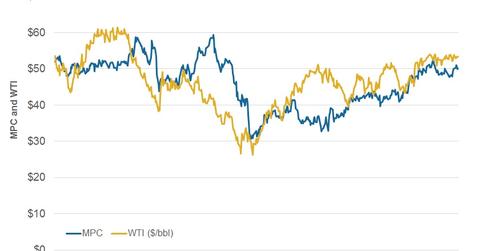Understanding the Correlation between MPC’s Stock and Oil Prices
The correlation coefficient of Marathon Petroleum and WTI stands at 0.35—a positive but feeble correlation.
Feb. 24 2017, Updated 7:35 a.m. ET

What is a correlation coefficient?
In this series, we’ve analyzed Marathon Petroleum’s (MPC) stock performance, analyst ratings, dividend yield, PEG ratio, valuations, beta, short interest, institutional holdings, and implied volatility. In this final part, we’ll examine the correlation between MPC stock and oil prices.
The correlation coefficient shows the relationship between two variables. A correlation coefficient value of zero to one shows a positive correlation, with zero reflecting no correlation, while a -1 to zero value shows an inverse correlation. We have considered the 12-month price history of Marathon Petroleum and WTI (West Texas Intermediate) crude oil below.
MPC stock and oil prices
The correlation coefficient of Marathon Petroleum (MPC) and WTI stands at 0.35. The correlation value for MPC stock and the price of oil shows that these two variables have a positive but feeble correlation.
Notably, Marathon Petroleum stock has been moving in line with WTI prices, but only to a certain extent. This means that ~35% of the movement in MPC’s stock price can be explained by changes in oil prices.
Peer correlation analysis
The situation remains the same for MPC peer Tesoro (TSO). The correlation of TSO versus WTI stands at 0.25. But the correlation is quite lower for Valero Energy (VLO) standing at 0.10. Other downstream players like Delek US Holdings (DK) and Phillips 66 (PSX) show slightly higher correlations of 0.34 and 0.43 to WTI, respectively.
But when analyzing any integrated energy company, we should notice that, usually, its correlation to the price of oil is typically higher than that of a downstream company. A case in point is Suncor Energy (SU), an integrated energy giant that has a 0.66 correlation with WTI. This is because integrated energy companies have upstream operations as well as with downstream activities.
Remember, an upstream segment’s earnings are directly impacted by the level of crude oil prices. In fact, in a higher oil price scenario, upstream earnings constitute a major portion of integrated energy companies’ earnings.
If you’re looking for exposure to refining sector stocks, you might consider an ETF like the iShares North American Natural Resources ETF (IGE). IGE has ~7% exposure to refining and marketing sector stocks.
